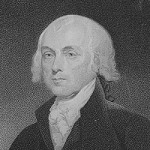
James Madison, Father of the Constitution
“Every word of the Constitution decides a question between power and liberty,” James Madison
The Constitution’s Third Amendment has never been the controlling law in any case decided by the US Supreme Court, and has been of critical importance in only one appellate case[1] in the nation’s history. It is often ignored and in some ways considered vestigial[2] having been a response to an anachronistic military practice. It does however decide a question between power and liberty with these words:
 “No soldier shall, in time of peace, be quartered in any house without the consent of the owner, nor in time of war, but in a manner to be prescribed by law.”
“No soldier shall, in time of peace, be quartered in any house without the consent of the owner, nor in time of war, but in a manner to be prescribed by law.”
The Third Amendment, like many other provisions of the Bill of Rights responded to colonial grievances against King George. The Declaration of Independence listed 27 against the King, among them: “…quartering large bodies of armed troops among us…”
The Quartering of British Soldiers in the Colonies
In 1765 and 1774 Parliament passed laws requiring American colonists to shelter and feed British soldiers. The Quartering Act of 1774 was among the Intolerable Acts that set the table for the American Revolution.
In 1765, Parliament ordered that British soldiers in the colonies be housed in barracks, public houses, private commercial property[3], and uninhabited homes. The Quartering Act of 1774 added to 1765 act requiring colonists to house troops in private homes as well.
Property owners received no compensation and, in fact, were mandated to provide soldiers with necessities such as food, liquor, salt, and bedding, also without compensation.
Third Amendment a Response to the Quartering Acts
The Third Amendment, while not the basis of court opinions, stands for the proposition that had been a hallmark of free Englishmen at least since the 16th Century and best expressed by Sir Edward Coke in 1628: “For a man’s house is his castle, et domus sua cuique tutissimum refugium“[and his home his safest refuge]
Coke’s expressed an English principle that had been ignored by the British in the colonies. Fresh in the memories of the Founding generation, the response was the Third Amendment.
The colonial objection to having soldiers in their homes was not forgotten when the Revolution ended and the Constitution was proposed. During the ratification debates in 1788-89 there was concern that the proposed Constitution did not contain specific protections for citizens from government abuse. Advocates of the Constitution promised to add such protections once the new government began operation.
This promise was kept, and the Third Amendment became part of the Bill of Rights proposed in 1791. Secretary of State Thomas Jefferson announced the adoption of the amendment on March 1, 1792.
Third Amendment In History, More Ignored Than Honored
In the congressional debates on Bill of Rights Amendments in 1789, South Carolina Rep. Thomas Sumter was recorded in the official proceedings with these thoughts: “Mr. Sumter hoped soldiers would never be quartered on the inhabitants, either in time of peace or war, without the consent of the owner.” A guarantee was needed Sumter said because otherwise “their property would lie at the mercy of men irritated by a refusal, and well disposed to destroy the peace of the family.”
A fair reading of “nor in time of war, but in a manner to be prescribed by law“, means regular Third Amendment violations happened during the War of 1812 and the American Civil War. In both cases, a de facto state of war existed, but forced quartering occurred “in a manner” which was not “prescribed by law“. While the War of 1812 was conducted under a congressional declaration of war, a congressional declaration of war never was passed against the Confederate States. This would mean that the forced quartering in loyal Union states would have been covered by “No soldier shall, in time of peace, be quartered in any house” even if the second part did not.
The attack on Fort Sumter on April 12, 1861 launched the Civil War. During the War, despite the Third Amendment, the 1789 warnings of Congressman Sumter, for whom the fort was named, came to pass.[4] The history of these two wars and a World War II occupation of the homes of Native Americans by the US military[5] in Alaska, indicate that the dearth of cases on the Third Amendment is not from lack of violations. These examples show that vigilance is required to defend every part of the Bill of Rights.
Deciding a Question Between Power and Liberty
While primarily ignored and little litigated, the Third Amendment draws a sharp distinction between the private and the public. The personal privacy implicit in the Third Amendment has been viewed by the Supreme Court as giving expression to the Constitution‘s establishment of a limited government and context to non-enumerated rights.
While not the basis of decision, the Third Amendment was among the building blocks[6] that resulted in the right to privacy outlined in Griswold v. Connecticut. In 1965, the Court overturned a Connecticut law restricting distribution and use of contraceptives.[7] While not the basis of decision in any case, the Third Amendment marked a significant distinction between public and private. It is a statement of the critical sense of privacy that had developed in the Revolutionary generation.
The value of recognizing the Third Amendment may have been best stated by Supreme Court Justice Story in his Commentaries on the Constitution: “This provision speaks for itself. Its plain object is to secure the perfect enjoyment of that great right of the common law, that a man’s house shall be his own castle, privileged against all civil and military intrusion …” The Third Amendment took revulsion to an old military practice and created a principle, that of a right to domestic privacy, relevant in the 21st Century.
At the time the Third Amendment was ratified, the images and memories of British troops in Boston and other cities were still fresh, and the clashes with colonists that drew the country into war still evoked strong emotions.
The Third Amendment is not a vestigial appendage of the Constitution. The Third Amendment did decide a question between power and liberty as does every word of the document. It is perilous to freedom to think of any portion of the document as vestigial.[8]
[1]Other than Engblom v. Carey, 677 F. 2d 957 (2d Cir. 1982), on remand, 572 F. Supp. 44 (S.D.N.Y.), aff’d. per curiam, 724 F.2d 28 (2d Cir. 1983), there have been no cases dealing with the Third Amendment. In that case national guardsmen were ordered to take over the residences of prison guards. The court found a violation of the Third Amendment.
[2]Vestigial: Relating to a body part that has become small and lost its use because of evolutionary change
[3] Such as inns and stables.
[4] The best available discussion of the government ignoring the Third Amendment during the War of 1812 and the Civil War is by Thomas Bell.
[5] Thomas Bell, Property Rights and the Third Amendment.
[7] Griswold was among a series of cases regarding privacy that resulted in Roe v. Wade
[8] A recent article in the ABA Journal, How Did America’s Police Become a Military Force on the Streets?, suggests that the kinds of concerns expressed by the Third Amendment are at issue in the way American law enforcement has evolved.








[…] Amendment III […]